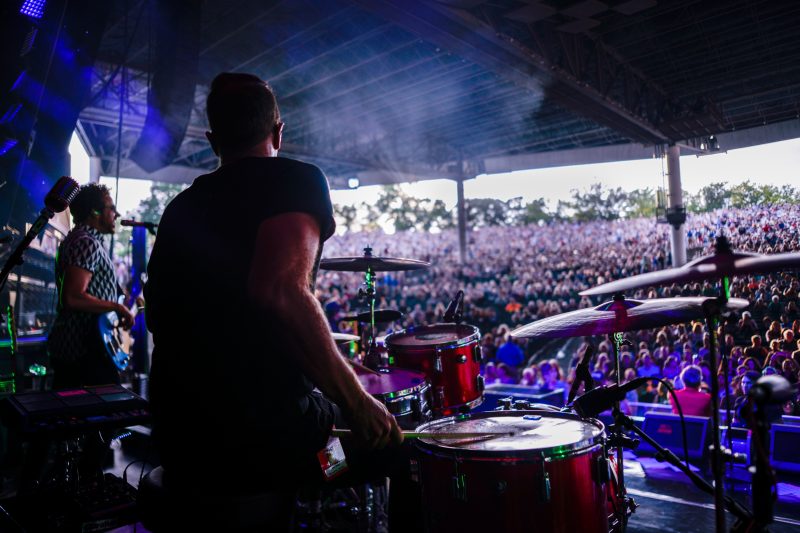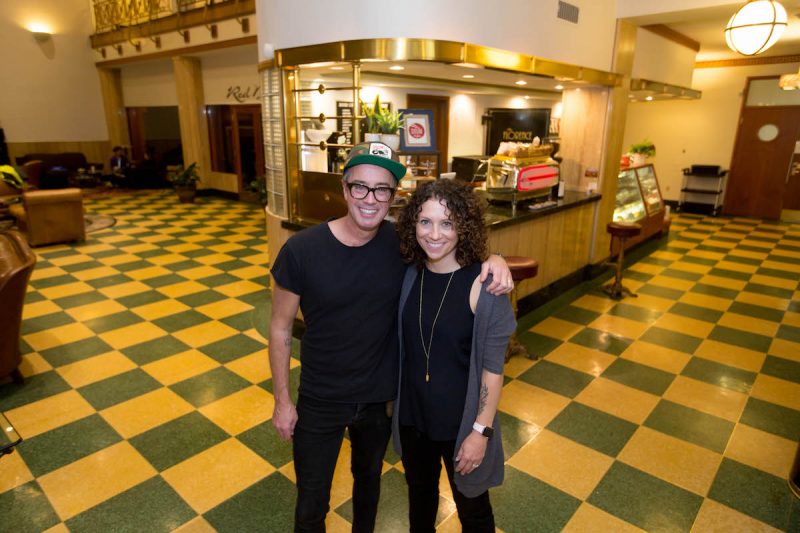What do coffee roasting and drumming have in common? John Wicks has a surprising answer: “Both are like walking a tightrope, knowing you can screw it up at any moment.”
Wicks, drummer for the pop phenom Fitz and the Tantrums, is as passionate about his music as he is about Drum Coffee, and Missoula-based company he formed in 2016 with his wife, Jenna. Three years later, Drum has evolved from a cozy neighborhood coffee bar and bakery on South Ave., adding a roasting and wholesale business on Broadway that ships around the globe, and just this spring, slipping into the former Posh Chocolat espresso bar in the historic Florence Building (which still sells the Missoula chocolatier’s addictive creations).
Coffee + Chocolate
The latest move was a surprise for Wicks and his wife, born of friendship and synchronicity. “I didn’t want to open any more cafes,” he says. “That’s not my goal.”
But Charlie Beaton, the owner of another happy-making Missoula establishment, Big Dipper Ice Cream, introduced the Wicks to Posh owners Jason and Ana Willenbrock – Culinary Institute of America-trained chefs by trade, chocolatiers by choice. The Willenbrocks wanted to keep a presence in the Florence for their artisanal chocolates, but wanted someone passionate about coffee to take over that aspect of the business. “It was just not their thing.”
When he walked into the gracious Art Deco building, constructed in 1942 (after two previous versions burned down), “it’s like everything I try to attain in my cafes was already there. It’s just gorgeous.”
Plus, chocolate and coffee are such a dynamic duo. “Coffee tastes like it smells when it’s being roasted,” says Wicks. “It often has those chocolaty notes to it by nature – I think that’s why they go together so well.”
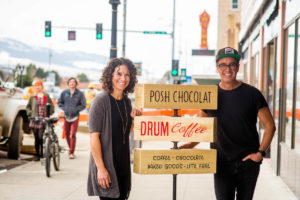
Steal this idea!
Like his other locales, the new Drum gives back to the community. Each quarter, the company selects three nonprofits, and each time a customer makes a purchase, they vote for one. At the end of the quarter, Drum allocates 2% of sales, based on votes.
It’s a business model Wicks first encountered at Blue State Coffee in Boston, “and it just blindsided me. Why wouldn’t you do that – give back to the community that supports you?”
He suspects this act of generosity also works in reverse. “People who don’t ever expect this donation to come in their mailbox suddenly get a check and become friends.” More importantly, it’s fun and feels good.
“I wish more folks would steal this idea, like I stole it.”
Like his other cafes, customers can also expect the same friendly staff and “blue-collar” feel. “The Italians have done it right ever since they started it,” he says. “Cafes should be a place where people come to gossip, to hear the news, to get to know each other.”
Missoula love affair
The serendipity of his latest move epitomizes Wicks’ ongoing love affair with Missoula – his wife’s hometown. They moved back in 2012 from Los Angeles, as Fitz and the Tantrums were ascending to stardom.
He says now, “It’s the second best decision I ever made. The first best decision was to marry my wife.”
He makes his living in a “kind of shady industry … I was always having to watch my back, look out for my family.” As a result, he became jaded, distrustful.
But Missoula has a different feel: “No one wants anything from me.”
And as a trail runner, he began to intimately connect with the valley and hillsides surrounding his new home. “I know where certain rocks are, where certain trees are. When I’m away for a long time, I feel the same longing for Missoula as for a companion.”
“What Missoula has really done for me is given me faith in humanity again, and made me trust in people again. It’s made me a happier and better person.”
From the beginning
Wicks is the son of a Navy commander and a music-loving mother. He moved around a lot, but credits the years his dad was stationed in New Orleans with inspiring his love of jazz. “My mom was a very big fan of jazz music and was also extremely outgoing. She would take me in tow wherever she went – whether it was Mardi Gras, or just standing outside an African American church until they invited us in.”
Those soulful sounds poured in his ears, and fueled his innate sense of rhythm. “It was always drums,” he says. Even before he had a drum kit, he’d tap on the back of headrests to the beats emanating from the car radio.
When the family settled on Bainbridge Island in Puget Sound, he began taking drum lessons. His teacher “was constantly giving me records, and supporting and pushing me in a great way.”
His parents were supportive too, although “I don’t think they realized where it would go,” he says.
His mother, in particular, encouraged him to perform live and with people who were better players. “I’m forever grateful for that.”
At Central Washington University in Ellensburg, he continued to study music, “but my folks’ support was waning.” He tried other fields – communications and graphic design – “but I was still spending every spare minute practicing drums.”
When he announced to his dad that he wanted to attend the prestigious Berklee School of Music in Boston, his father replied, “You’re on your own. We’re not paying for music school.”
A partial scholarship helped finance a year. “Then I was broke, living on a bag of potatoes and Top Ramen.”
He moved to New York City and was quickly disillusioned when he saw his heroes in the jazz world “basically passing the hat to make extra tips.”
The Seattle years
Wicks returned to Seattle, and went to work at the very first Starbucks near Pike Place Market, “until the green aprons came out.”
Along the way, he learned some tricks from the coffee giant – namely how to make it easy to order and pick up a beverage. “When people have their morning fog on and don’t want to think, it’s a no brainer when they walk in. They’re masters of that.”
At the same time, he learned what not to do: Be bland and impersonal.
The attitude at the little joints where he worked as a barista for the next several years flavors his Missoula venues. “The small independent cafes were all about the personality, the creative people behind the counter. Why would I ever want to suppress that? It’s what makes the fun happen.”
His music life was brisk too. He was playing four or five nights a week, for $50 a gig. And while he still loved jazz, “I started to realize I liked different kinds of music.” He began listening to punk and hip-hop, and developed a passion for getting people to move. “I really enjoy trying to get a room full of people to dance.”
To explore this new musical turf, he decided to become a studio musician. “All my hero drummers were from that world, and I wanted to know what that skill set was.”
Eventually he and Jenna (who met and married in Seattle) moved to LA, after a famous drummer advised him: “At least when you’re starving, you’re gonna be warm.”
“A year went by in an eye-blink, and the phone was not ringing,” Wicks recalls. He played in dive bars, joined punk bands he found on Craigslist.
Finally, a producer recruited him to play on Bruno Mars’ debut album, Doo-Wops and Hooligans. Cee Lo Green’s albums Lady Killer and Heart Blanche came next, and more gigs followed, including session work and live performances with B.o.B., George Clinton, David Byrne, Chocolate Genius, Money Mark, Teddybears, RZA and many more.
“I love being in the pressure cooker of the studio,” he says. “I miss all those eyes being on me, asking, ‘What are you going to do to make this song great?’”
Life as a Tantrum
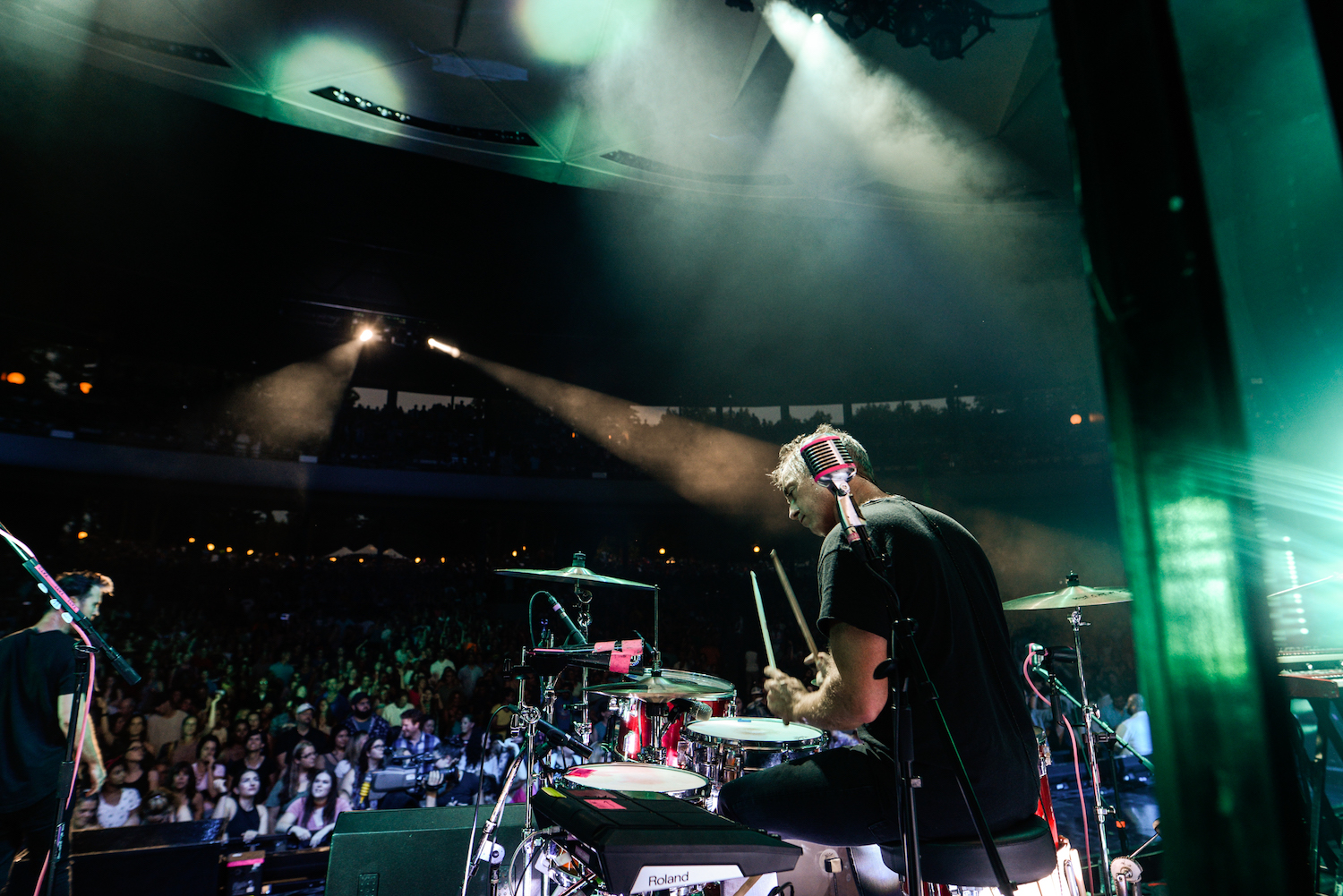
Wicks misses session life because since 2008, he’s been the full-time drummer with Fitz and the Tantrums. When he met the band’s lead vocalist, Michael “Fitz” Fitzpatrick, he recognized a shared intensity. “He’s just as driven – if not more so – especially in the business realm.”
Lines began to form around the block just to see the band, which also includes Noelle Scaggs (vocals), James King (flute and sax), Jeremy Ruzumna (keyboards), and Joseph Karnes (bass). “We knew something was up,” says Wicks.
A decade later finds them on the verge of releasing a new album and headlining a three-month national tour with Young the Giant. The band’s addictive, dance-inducing style not only fills arenas, it also finds its way into movies and commercials, and lands them engagements at corporate parties for the likes of Google and Apple.
In short, “the music we play is conducive to people having a good time and partying.”
“I never in my wildest dreams thought I’d be able to live where I want to live, and make a living, support my wife and two kids, just by doing this drum thing,” says Wicks.
The music he makes now leaves little room for the improvisational flair of jazz. The arena shows are carefully cued and scripted. “The challenge now for me is to stay present and still make music and not feel like a machine.”
Fortunately, the band will be playing songs from its new album on tour. “I’m looking forward to that.”
He’s also working closely with Nick Checota of Logjam Productions to schedule a return trip to Missoula. The band played at Big Sky Brewing Amphitheater in 2016, with his Drum employees flanking the stage. “That show was extremely special, just because it’s my hometown,” he says. “So many smiling faces!”
This time, he hopes to play at Logjam’s Kettlehouse Amphitheater on the Blackfoot River. “We’re hoping to get something tagged on to the tour at the end of summer.”
Dad’s in the “Handclap” band
Of course, there’s a price to be paid for living much of his life on the road. “I miss out on too many things – kids’ birthdays, ballet recitals – it just kills you.”
As for his twin daughters, they seem mostly unimpressed with their father’s fame. “If a kid at school asks, ‘is your dad really the drummer for the Handclap song?’ they think that’s cool,” says Wicks. But mostly, “they see the stress side … They have a more realistic idea of what’s going on.”
Yet, they seem to have inherited their father’s drive and talent. He describes daughter Betty as possessing “one of the most ridiculous natural abilities on drums that I’ve ever seen” and says Ruby “is the same with the violin and piano. And now she wants to play the drums as well.”
“At least my stress hasn’t dampened their enthusiasm for music,” he adds.
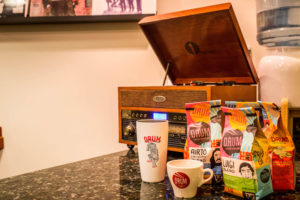
Although he’s also a successful songwriter, drums remain his medium. “I can’t think of another instrument that has the same power to move people. There are so many polyrhythmic aspects when you have all four limbs going at once,” he says.
“When I’m alone here in the practice room, that’s what I think about.”
Feeding the Ritual
Back home, Wicks also contemplates coffee. The fragrance of beans, the way they respond to heat, the challenge of unlocking “the flavor profiles” of beans grown around the world.
And he considers the importance of “feeding the ritual.” His own: getting up at 4:30 a.m. to practice drums before his daughters wake for school. Running on mountain trails that, this time of year, meander through greening larch, arrowleaf balsamroot and glacier lilies.
Or the ritual of his customers: “In the end, people want something that tastes good, jump starts their day and makes them feel happy when they walk out the door.”
– Kristi Niemeyer
